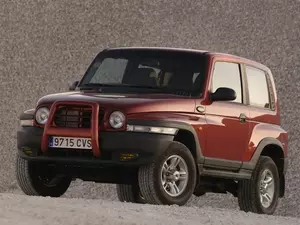
| Vehicle | Curb weight | Difference from world's smallest | Weight to power ratio | 0—60 mph acceleration ratio | Consumption ratio |
|---|---|---|---|---|---|
| 2.9 TD |
1815 kg / 4002 lbs |
1390 kg (3065 lbs) heavier | 15 kg to 1 hp | 100 kg/s (221 lbs/s) | - |
| 2.9 D |
1750 kg / 3859 lbs |
1325 kg (2922 lbs) heavier | 18 kg to 1 hp | 97 kg/s (214 lbs/s) | - |
| 2.3 |
1710 kg / 3771 lbs |
1285 kg (2834 lbs) heavier | 22 kg to 1 hp | 72 kg/s (159 lbs/s) | - |
| 2.3 i 16V |
1760 kg / 3881 lbs |
1335 kg (2944 lbs) heavier | 13 kg to 1 hp | 109 kg/s (240 lbs/s) | - |
| 2.0 i 16V |
1755 kg / 3870 lbs |
1330 kg (2933 lbs) heavier | 14 kg to 1 hp | 100 kg/s (221 lbs/s) | - |
| 2.3 TD |
1750 kg / 3859 lbs |
1325 kg (2922 lbs) heavier | 22 kg to 1 hp | 74 kg/s (163 lbs/s) | - |
| 3.2 |
1830 kg / 4035 lbs |
1405 kg (3098 lbs) heavier | 9 kg to 1 hp | 193 kg/s (426 lbs/s) | - |
| Vehicle | 2.9 TD |
|---|---|
| Curb weight |
1815 kg / 4002 lbs |
| Difference from world's smallest | 1390 kg (1390 lbs) heavier |
| Weight to power ratio | 15 kg to 1 hp |
| 0—60 mph acceleration ratio | 100 kg/s (221 lbs/s) |
| Consumption ratio | - |
| Vehicle | 2.9 D |
| Curb weight |
1750 kg / 3859 lbs |
| Difference from world's smallest | 1325 kg (1325 lbs) heavier |
| Weight to power ratio | 18 kg to 1 hp |
| 0—60 mph acceleration ratio | 97 kg/s (214 lbs/s) |
| Consumption ratio | - |
| Vehicle | 2.3 |
| Curb weight |
1710 kg / 3771 lbs |
| Difference from world's smallest | 1285 kg (1285 lbs) heavier |
| Weight to power ratio | 22 kg to 1 hp |
| 0—60 mph acceleration ratio | 72 kg/s (159 lbs/s) |
| Consumption ratio | - |
| Vehicle | 2.3 i 16V |
| Curb weight |
1760 kg / 3881 lbs |
| Difference from world's smallest | 1335 kg (1335 lbs) heavier |
| Weight to power ratio | 13 kg to 1 hp |
| 0—60 mph acceleration ratio | 109 kg/s (240 lbs/s) |
| Consumption ratio | - |
| Vehicle | 2.0 i 16V |
| Curb weight |
1755 kg / 3870 lbs |
| Difference from world's smallest | 1330 kg (1330 lbs) heavier |
| Weight to power ratio | 14 kg to 1 hp |
| 0—60 mph acceleration ratio | 100 kg/s (221 lbs/s) |
| Consumption ratio | - |
| Vehicle | 2.3 TD |
| Curb weight |
1750 kg / 3859 lbs |
| Difference from world's smallest | 1325 kg (1325 lbs) heavier |
| Weight to power ratio | 22 kg to 1 hp |
| 0—60 mph acceleration ratio | 74 kg/s (163 lbs/s) |
| Consumption ratio | - |
| Vehicle | 3.2 |
| Curb weight |
1830 kg / 4035 lbs |
| Difference from world's smallest | 1405 kg (1405 lbs) heavier |
| Weight to power ratio | 9 kg to 1 hp |
| 0—60 mph acceleration ratio | 193 kg/s (426 lbs/s) |
| Consumption ratio | - |